A Consumer Reaction to Natural Wine
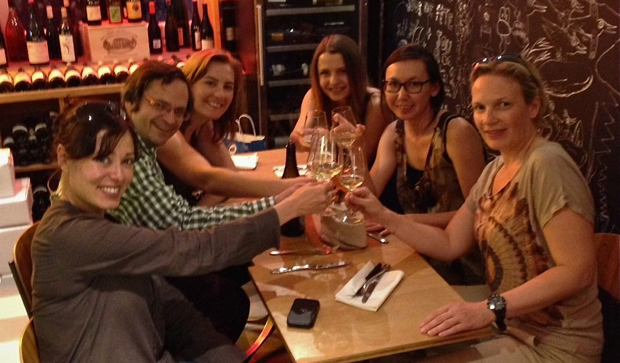
By Panos Kakaviatos for wine-chronicles.com
The natural wine movement is growing although some are calling it a fad. I think a fad aspect exists, especially with the idea that sulfites are evil, that wine should have none.
Many of the vins naturels I have tasted in France for example contain little or no sulfites, and often require CO2 to preserve freshness. Made from organic viticulture (no pesticides or herbicides), with few artifices (avoiding non-indigenous yeasts, for example), the wines reflect a continued backlash against a widespread use of pesticides and herbicides in French vineyards not too long ago.
And that’s the plus side. As we become more conscious of what we eat, we should also become more conscious of what we drink, from water to wine. Certainly. The natural wine movement is international and growing. Take RAW in London for example. Or many other natural wine tastings around the world.
And some wines sans sulfites get very good reviews. Take for example Terre Inconnue Los Abuelos – a “Vin de Table” from France. Jamie Goode for example likes the wine in this review. I write this text after speaking with a friend, Julien Boulard, who works in Hong Kong in the wine industry, and he told me that the 2002 was amazing for a Grenache with no sulfites.
But there is (much) overkill.
There is this feeling that wines that are not “natural” are somehow inferior. Tell that to Eric de Rothschild, who has probably enjoyed more Lafite Rothschild wines than anyone else including ones that were made from vintages that were treated with pesticides. Is he dying of cancer because of that?
And then there are wines that taste spoilt or oxidized. Boulard also told me about his experience tasting wines from the well-known Domaine Riffault in Sancerre. “They were promising before bottling but afterwards, they tasted totally oxidized. I had a similar experience with other natural wines at a tasting in Bordeaux during Vinexpo 2011.
While researching an article for France Magazine on wine bars in Paris, I caught up with old friend Tim Johnston, owner of the always cozy and welcoming Juveniles – a reference for any wine bar lover in Paris.
With a wide choice of wine in a charming setting at 47 Rue de Richelieu, 75001, it seats about 30 maximum. Foods are tasty and traditional. And Johnston always has a trick up his sleeve; such as a 100 percent Cinsault from the southern Rhone Valley that only costs 22 euros a bottle at the restaurant.
When I asked him about natural wines, he snickered. “Such methods take wine back into the Dark Ages.” That the wines are unstable and undrinkable for the most part.
I then visited a natural wine bar in Paris, Epure, which opened at the beginning of 2013, in the fashionable 6th at 33 rue Mazarine. Bottles start at 10€, with glasses from 5€ to 16€. Owner Laurent Lapaire – a former manager at the three-star Michelin Arpège – claims that les vins naturels are how wines “should” be made. The lovely boat design of the bar draws in a casually chic crowd, The 1,000 different wine choices – all les vins naturels – include a gorgeous Bourgogne Aligote (white) from producer Philippe Pacalet, who is a part of the Association des Vins Naturels. The wine exudes mineral purity and fresh fruit.
But others I tried were annoyingly fizzy – using CO2 instead of sulfites to prevent oxidation. One smelled of rotten apples. Lapaire said that such a taste is “catching on.”
I hope not.
Back at Juveniles, visiting Australian winemakers Stephanie Toole of Mount Horrocks and Jeffrey Grosset of the celebrated Grosset Wines decried the new trend. “When they serve food at their establishments, is it spoilt?” Toole asked rhetorically.
My problem has been that too many natural wines do indeed taste oxidized or with volatile acidity. They are faulty, period. And I have little patience for advocates explaining to me that one should get used to such tastes.
What is undeniable is that the natural wine movement has many acolytes and is growing. But what is natural wine really? And should it have a name that somehow condemns other wines as “non-natural” – implying inferior quality? Pretentious?
The goals are noble. Avoiding pesticides and herbicides in the vineyard is a good thing, but a blind crusade against sulfites – which actually are natural and help preserve a wine’s freshness – can be misguided.
Testing by drinking – video report from Strasbourg
An efficient way to test such wines is to go out with non-wine geeks, normal consumers who have no “dog in the fight” who do not study wine, but do have experience drinking and enjoying it.
In the video above you will see their reactions at a popular (and very nice) Strasbourg wine bar, Jour de Fete, as well as explanations from natural wine bar rep Pierre Glista. I was joined with some colleagues from work and a couple of their friends. None of them are in the trade in anyway, but all of them enjoy wine. Of 800 wine choices, which include grand cru Burgundy and Alsace among others, 600 are natural wines.
We went through a series of wines, all more or less “natural”. Kudos to Pierre Glista for his excellent service and attention to our needs. The food by the way was terrific, from tasty sweet breads to buffalo mozzarella and fresh basil.
The evening began with a bubbly that enjoys a good reputation among the natural wine lovers. It is called La Sorga Don Qui Rotte, made in Bezier in southern France, but there’s no classification on these wines, excepting Vin de France. Apparently no additives at all, no sulfur and aged in bottle for well over a year. Produced from the Terret Bourret grape, most of us thought of apple cider, so Pierre poured a glass of real apple cider to illustrate the difference. Interestingly most of us preferred the real apple cider because it seemed to have more intensity of flavor. Perhaps I missed the nuances of the La Sorga Don Qui Rotte, but for 17 euros a bottle, I would rather buy a good Alsatian Crémant.
Then came an orange wine called Clémence made from Chardonnay by a producer in the Beaujolais region (Saint Etienne). It had a rabbit on the label and was of a very dark orange color with a cloudy aspect: unfiltered deposits in bottle. While this wine conveyed more character – and table discussion – than the preceding sparkler, a hard and drying finish detracted. Overall, flavors noted by friends à table included hints of Mead wine like honey. But this was very dry. “Medicinal” is how one of us described it. Nothing too exciting either, but certainly thought provoking. Yet again, more a conversation piece than a wine to seek out – according to our group.
Not included in the video came three more wines. Two Italian reds were more appreciated. First a full-bodied Lo Zerbone made with Dolcetto grapes, which pleased people although it was too drying on the finish, and one could feel the alcohol. Then the more popular
Azienda Agricola Cos Nero di Lupo (Nero d’Avola) 2010 from Sicily. The label stated 12 percent alcohol, but it felt like more. In any case it had pleasing earthy notes and proved subtler than the Lo Zerbone.
We ended thingswith the most popular wine of the evening, its palate cleansing role after the tannins from the reds no doubt influencing our judgment: a Rietsch Extra Brut Nature Crémant d’Alsace 2011, with no sulfites added and my personal favorite of the evening. This tasted pure and delicious enough that we ordered one more! So there you are: a very enjoyable wine sans sulfites.
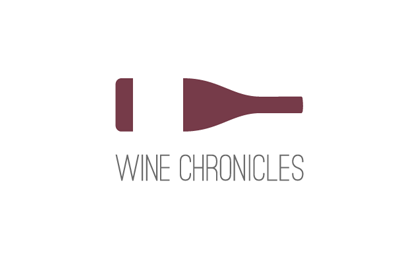 Wine Chronicles
Wine Chronicles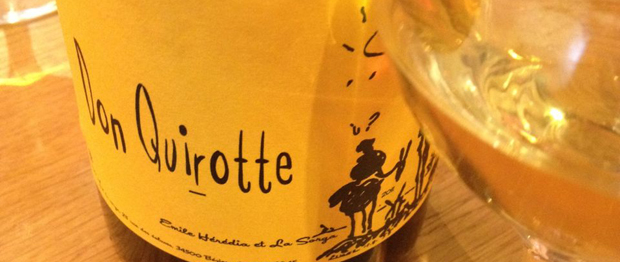
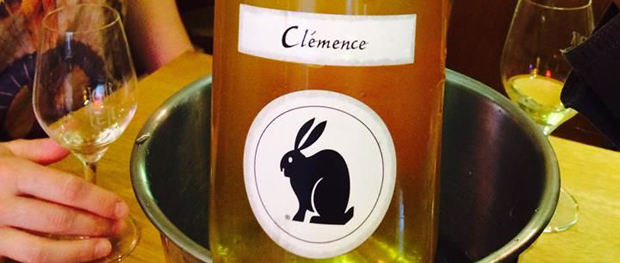
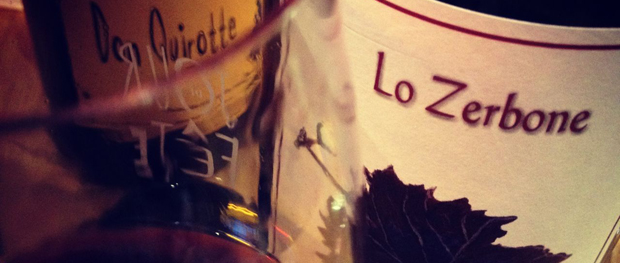
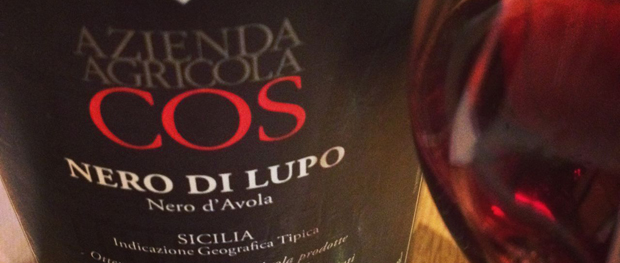


Loved the text and video esp wih non wine professionals. Would love to drink Georgian wines with you. They are making “natural” wines they same way they have for thousands of years with spectacular results without a “gimmick” or fad. At Raw this year most agreed he French underperformed.
It is great to care about he land and health but whether conventional or “natural” they still need to be well made and sadly in both areas there are winemakers who make crap.
It is no excuse for making a barnyardy wine.
I’ve tasted some exquisite wines over the years at natural events.
I only really drink them now. They have an energy and power and spirit when well made that transcends the fad.
This guy from the shop was not great at articulating the “movement.”
Pingback: A Consumer Reaction to Natural Wine | Wine webs...
Good article. I tend to agree with most of what you say. There are some very nice Natural wines but there is an aweful lot of rubbish on the bandwaggon. Naturalistas argue that there are a lot of awful conventionally made wines too, which is also true. The difference is that good wine bars and restaurants do not serve bad conventional wines, nor do they charge the customer a lot of money to drink wines that require a “recalibration” of their palate.
One point of order. It’s untrue to say that organic (or biodynamic) wines are made without pesticides. Herbicides no but pesticides (insecticides and fungicides) are sprayed on “organic” vineyards, sometimes with more regularity than “sustainable” or “integrated management” vineyards.
Thanks very much for the thoughtful comments, Sarah and Jonathan – and for the point of order.
i love how you say:
‘Juveniles – a reference for any wine bar lover in Paris’
and yet a paris wine blog says:
‘I’d put off visiting solely on the grounds that no one whose opinions I respect has ever said a peep about the place. It doesn’t seem to be on the radar of quality-conscious people.’
lol.. maybe yr references are outdated???
Tim Johnston is a great guy, as ever. I would disagree with the Paris wine blog. Just because Tim is against natural wines is no reason to not go :-). He has an excellent choice of wines from France, although he is not a big Bordeaux fan. You can find great value wines from southern France for example, as well as a fine choice of cuisine. And the place is quite cozy. I was there about two years ago, and do not think the style or positive experience has changed much… Cheers!
I’m not young and have been drinking wine since I was a boy. I had to drink through the 70s when good wine was hard to find. The 80s brought in the fruits of the labour of a younger generation who eschewed chemical fertilisers, additives, overmanipulation etc. Many turned to organic and biodynamic farming methods. Over productive clones were eliminated. Over the last 15 years I have drunk many natural wines – wines sold as being “natural”. There have been a few good ones, many poor ones and not few enough undrinkable examples. In reality I’d jump over a dozen bottles of the better ones to get to a bottle of basic Morey St Denis from Domain Dujac or a simple Bourgogne Rouge from the likes of Barthod Nolleat.
Fully agree with your conclusion 😉